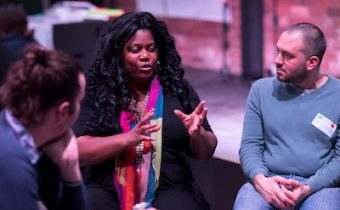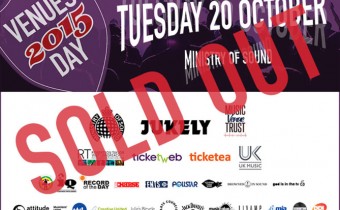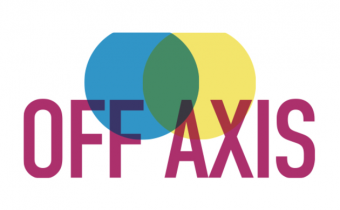Altogether now: how collaborations between independent music producers and established arts organisations can benefit all
In these straitened times, everyone suddenly wants to collaborate. For independent music producers though, collaboration has long been a way of life, and a way of making great work. In this blog, recently published by Guardian Culture Professionals, hub director Julia Payne explores how collaborations with these independents can benefit established arts organisations.
In music, the producer ‘function’ feels like it’s still in its infancy. This is true even though I first worked with producers like Alex Poots and Como No’s Andy Wood at the Barbican in the mid ‘90s, and produced my first events some 18 years ago. Fast forward to 2012, and I’d say that vision, curiosity and sheer bloody mindedness are pretty much hardwired into the DNA of any producer. We’re not necessarily artists (although some of us, like Will Dutta, are but we’re passionate about making good work. We’re not promoters, but we’re just as audience focused. Freed of the constraints of working only in one context, we’re able to constantly explore new ways of creating and presenting the music that inspires us, and of facilitating new experiences for artists and audiences. Madeleine Keep from Tate Britain likens music producers to fashion designers, in that we can produce totally bespoke “haute couture” events or “make something beautiful for the high street”, that might tour nationally. As Kate Tyndall says in the Arts Council England and the Jerwood Charitable Foundation’s The Producers, “The producer leads in navigating a bold vision of an idea and how feasibly – and brilliantly – to deliver it… give it life and locate it in the world”. Cast your mind back to the music Underworld curated for the Olympics opening ceremony, the Liverpool Biennial launch produced by Samizdat, or to the insanely ambitious Africa Express, and you begin to see what she and Madeleine mean.
.
Of course, these independent music producers didn’t make these projects happen alone; they worked collaboratively with (much larger) partner organisations. For music producers, collaboration has long been a positive choice; it opens up exciting new possibilities – for us, the artists we work with, audiences and – of course – the organisations we partner with. Between 2001-2010, the hub collaborated with fellow producers SoundUK to produce the Fertilizer festival. Neither company could have done it alone, we learnt a lot from each other, and continue to reap the rewards of the collaboration. As with any meaningful collaboration it’s had a long term impact on the thinking and practice of all concerned.
Working collaboratively means that both music producers and the arts organisations we work with are able to develop new areas of programming, more ambitious, bespokes event and new ways of working with or commissioning artists. As Ash Chandola from Swaraj Music says, “[Collaboration] develops me as a producer, it develops the artists I work with, and the organisations I work with. It raises the bar for all of us”.
In addition, these kinds of collaborations often develop new audiences. At the hub, partnerships with Summer Sundae Weekender and Dartington Arts around our Phrased & Confused music and spoken word programme have yielded 16 new commissions and a new audience of 6500+; we’ve all benefitted from this and been able to develop a more unique offer. On the same theme, one curator at a London gallery (who shall remain nameless!) tells me that the gallery’s collaborations with music producers bring in audiences who “are so much younger and better looking than our usual crowd”!
In recent months I’ve been working with colleagues at PRS for Music Foundation to select arts organisations to take part in New Music Plus…, a producer development programme we developed and have delivered jointly since 2009. Through the programme, arts organisations collaborate with a music producer for 18 months. The overwhelming interest we’ve had from arts organisations clearly suggests that in times of recession many venues see collaboration and new areas of programming as key to their future sustainability. The new audiences they generate have a positive impact on the bottom lines of everyone involved, via higher box office and secondary income, and even additional grant income.
In many ways, New Music Plus… feels like a coming of age for the producer role in the music sector. I find myself in the enviable position of being surrounded by amazing producers of all ages, of being able to develop ideas with them, share the learning we as the hub team have developed over time, and support another generation to develop the foundations of a sustainable career. Through this collaboration with the PRS for Music Foundation, I feel that we’re finally beginning to validate the role of music producer and articulate just what we as creative individuals bring to the table. And one thing’s for sure, there’s no way that would have happened if we weren’t working in partnership.
Details of the producers and arts organisations taking part in this latest UK-wide round of New Music Plus…. programme can be found here.



